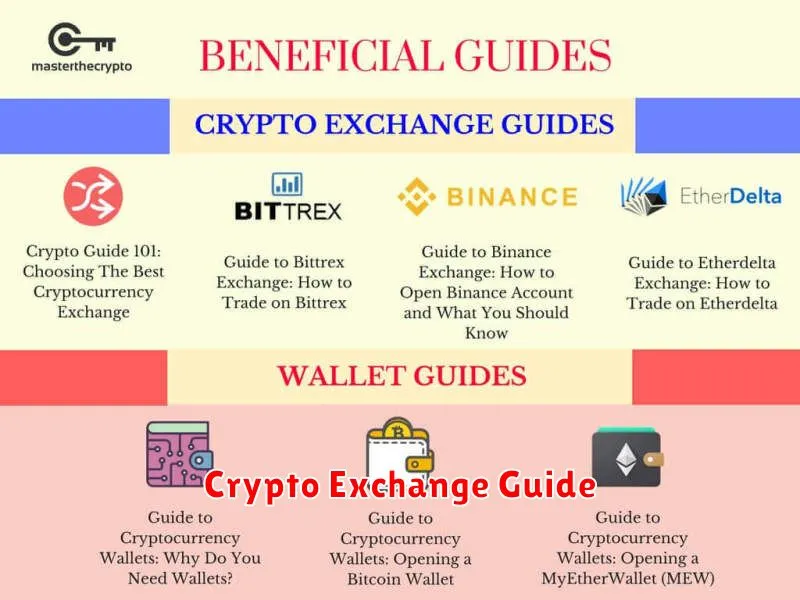Choosing the right crypto exchange is crucial for a seamless and secure cryptocurrency trading experience. This guide will help you navigate the complexities of selecting a platform that best suits your needs, covering key factors such as fees, security, available cryptocurrencies, user interface, and customer support. Learn how to compare different exchanges and make an informed decision to ensure a smooth and profitable journey in the exciting world of digital assets and blockchain technology.
Centralized vs Decentralized Exchanges
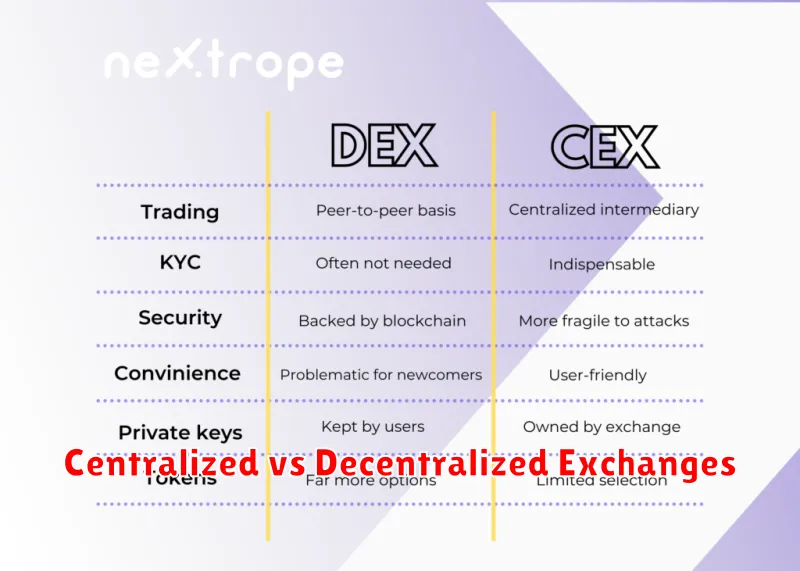
Choosing between a centralized exchange (CEX) and a decentralized exchange (DEX) is a crucial decision when selecting a cryptocurrency platform. Each offers distinct advantages and disadvantages.
Centralized exchanges, like Coinbase or Binance, act as intermediaries, holding users’ funds. This offers convenience and generally higher liquidity, meaning easier buying and selling. However, they are subject to security risks, including hacks and regulatory scrutiny. Users also cede control of their private keys to the exchange.
Decentralized exchanges, on the other hand, operate without a central authority. Users retain control of their private keys, enhancing security. They often prioritize privacy and anonymity. However, DEXs typically have lower liquidity, potentially resulting in higher slippage (the difference between the expected price and the actual execution price) and more complex user interfaces.
The best choice depends on individual priorities. Users prioritizing ease of use and high liquidity should consider a CEX. Those prioritizing security and control over their assets might prefer a DEX. Carefully weigh the security risks, liquidity, and user experience before making your decision.
Key Security Features to Look For
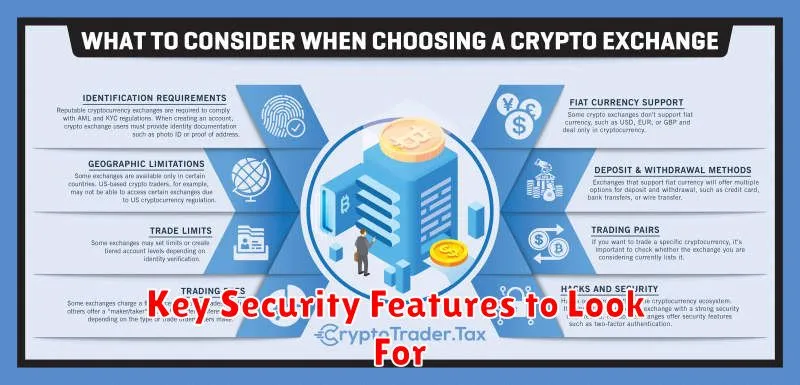
Choosing a secure crypto exchange is paramount. Security should be your top priority when selecting a platform. Look for exchanges that employ robust security measures to protect your assets.
Two-factor authentication (2FA) is a fundamental requirement. This adds an extra layer of security, making it significantly harder for unauthorized individuals to access your account even if your password is compromised.
Cold storage of the majority of their crypto assets is a critical feature. This means the exchange keeps the bulk of its users’ funds offline, in secure, offline wallets, significantly reducing the risk of hacking.
Regular security audits by reputable third-party firms are a strong indicator of an exchange’s commitment to security. These audits help identify vulnerabilities and ensure the platform is up to industry standards.
Insurance and compensation funds provide an additional layer of protection. In the unlikely event of a security breach, these funds can help compensate users for any losses.
Transparency regarding security practices is essential. A reputable exchange will openly communicate its security protocols and any incidents that may have occurred. Be wary of exchanges that are opaque about their security measures.
Finally, consider the exchange’s reputation and track record. Research user reviews and look for any history of security breaches or questionable practices.
Understanding Trading Fees and Hidden Costs
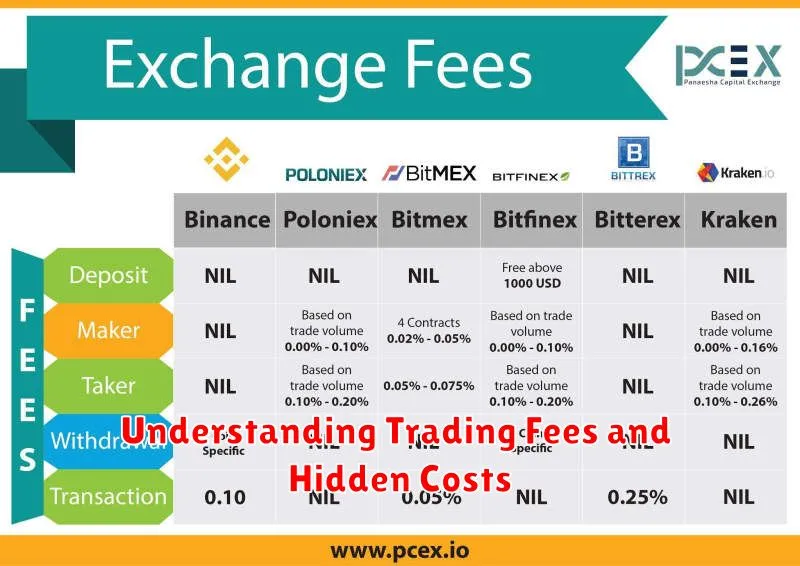
Choosing a crypto exchange involves carefully considering the fees. Trading fees are the most obvious, typically charged as a percentage of the trade value or a fixed amount per trade. These can vary significantly between exchanges, so comparing fee structures is crucial. Look for clear breakdowns of maker and taker fees, which differ based on whether your order adds liquidity (maker) or removes it (taker).
Beyond trading fees, be aware of hidden costs. These can include deposit and withdrawal fees, which might involve cryptocurrency network fees (gas fees on Ethereum, for instance) or the exchange’s own charges. Some exchanges also impose minimum withdrawal amounts or have fees for inactivity or account maintenance. Pay close attention to the fine print to avoid unexpected charges.
Conversion fees can also significantly impact your overall costs, particularly when converting between different cryptocurrencies on the exchange itself. Finally, consider interest rates if you plan on using lending or staking services offered by the exchange. Understanding all these costs allows for a more accurate assessment of the exchange’s true pricing.
Liquidity and Market Volume Considerations
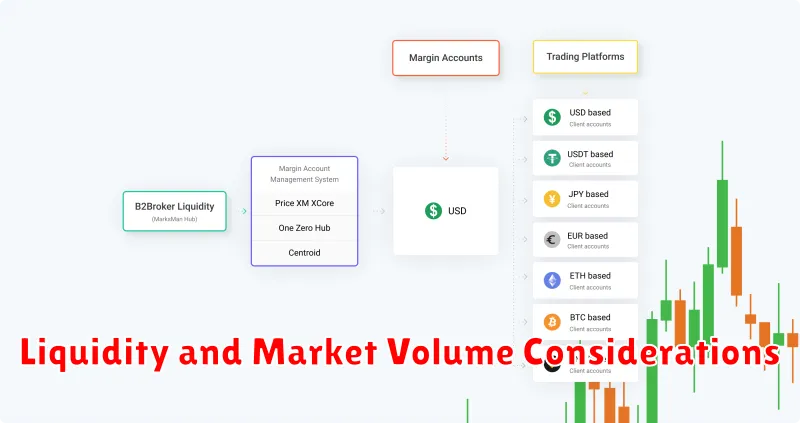
Choosing a crypto exchange with sufficient liquidity and high trading volume is crucial for successful trading. High liquidity ensures you can easily buy or sell your crypto assets without significantly impacting the price. A large trading volume indicates a vibrant market with many active buyers and sellers, reducing the risk of slippage and improving the chances of executing trades at favorable prices.
Liquidity refers to the ease with which an asset can be bought or sold without significantly affecting its price. Exchanges with high liquidity offer tighter bid-ask spreads, meaning the difference between the buying and selling price is smaller. This translates to lower transaction costs for you.
Market volume, represented by the total amount of cryptocurrency traded over a specific period, is a key indicator of an exchange’s activity and health. Higher volume typically means more competitive pricing and faster order execution. Before selecting an exchange, research its trading volume for the specific cryptocurrencies you intend to trade. Consider examining data across different timeframes (daily, weekly, monthly) to gain a comprehensive understanding.
In summary, prioritize exchanges with demonstrably high liquidity and trading volume to ensure smooth and efficient trading experiences. This contributes significantly to minimizing potential losses from price slippage and maximizing your trading opportunities.
User Experience and Customer Support
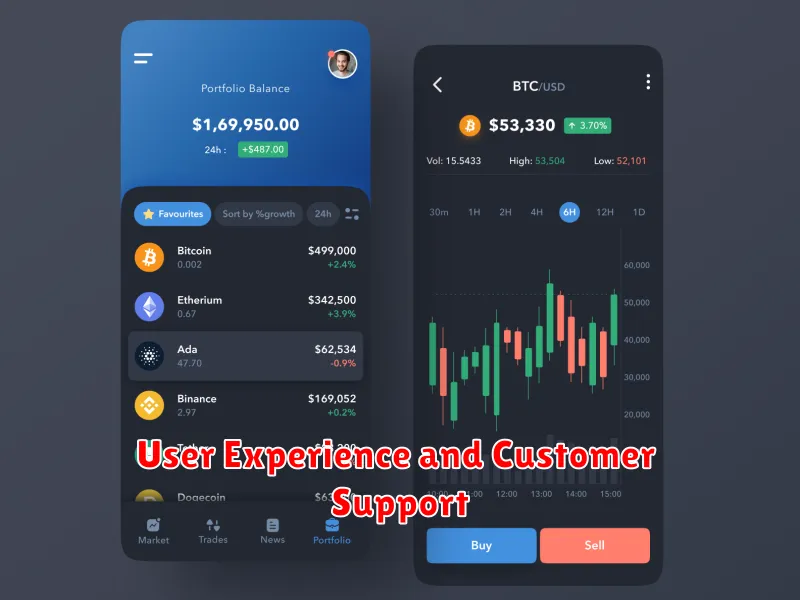
A positive user experience (UX) is crucial when choosing a crypto exchange. Consider the platform’s ease of navigation, intuitive interface, and mobile app functionality. A cluttered or confusing platform can lead to errors and frustration.
Equally important is reliable customer support. Look for exchanges offering multiple support channels such as email, phone, and live chat. Read reviews to gauge the responsiveness and helpfulness of their support team. 24/7 availability is a significant plus, especially given the volatile nature of cryptocurrency markets.
The availability of educational resources, such as FAQs, tutorials, and glossaries, can significantly enhance the user experience and help newcomers navigate the platform more confidently. A well-designed help center demonstrates a commitment to user satisfaction and accessibility.
Ultimately, a seamless user experience combined with readily available and effective customer support will contribute to a more secure and enjoyable trading experience, mitigating potential risks and increasing confidence in your chosen exchange.
Best Exchanges for Altcoin Trading
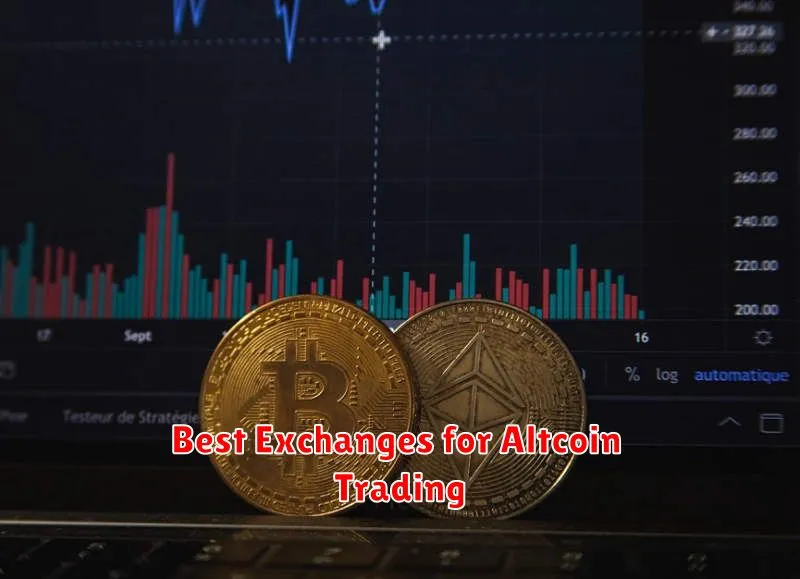
Choosing the right exchange for altcoin trading is crucial for a successful experience. Several factors influence this decision, including the availability of the specific altcoins you wish to trade, the fees charged per transaction, the security measures in place to protect your assets, and the trading volume which affects liquidity and price volatility.
Binance consistently ranks highly, offering a vast selection of altcoins and generally low fees. However, its interface can be overwhelming for beginners. Kraken provides a more user-friendly platform with a good range of altcoins and robust security features, but fees might be slightly higher. KuCoin is another popular option known for its extensive altcoin listings and often competitive fees, though users should assess its security features carefully before committing significant funds.
For those seeking a decentralized exchange (DEX), Uniswap on the Ethereum blockchain offers access to a wide variety of altcoins and allows for peer-to-peer trading without intermediaries. However, using a DEX typically requires a higher level of technical knowledge and understanding of smart contracts. Remember to always thoroughly research any exchange before depositing funds, paying close attention to user reviews and security audits.
Ultimately, the “best” exchange depends on your individual needs and trading style. Consider your preferred interface, the altcoins you intend to trade, your risk tolerance, and the security features provided before making a final decision. Prioritize security and research extensively to ensure a safe and profitable trading experience.

